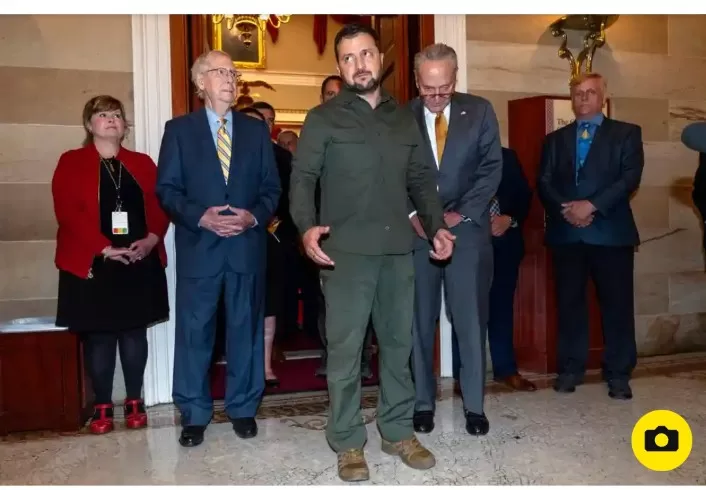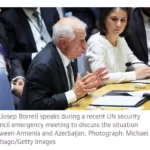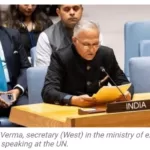In a resolute display of solidarity, Ukrainian President Volodmyr Zelensky clinched promises of steadfast support and critical air defense weaponry from President Joe Biden on Thursday. However, he issued a stark warning that the Russian threat looms large, particularly if Republican lawmakers in the United States decide to curtail military aid.
Sporting his distinctive olive green military-style attire, Zelensky engaged in crucial deliberations with members of the U.S. Congress before making pivotal stops at the Pentagon and the White House. The visit culminated in a ceremonial welcome by President Biden, complete with an honor guard.
Expressing profound gratitude, Zelensky underscored the significance of the assistance provided by the United States in the ongoing struggle against Russian aggression. He described it as nothing short of combating “terror” orchestrated by Russia.
Seated alongside President Biden beneath the watchful portraits of former American leaders George Washington and Abraham Lincoln, Zelensky conveyed his appreciation to Congress for their unwavering support, characterizing it as monumental.
President Biden, in turn, extolled the unwavering courage of the Ukrainian people as they valiantly resist Russia’s unrelenting incursion. He affirmed that the American populace is resolute in their commitment to ensuring global solidarity with Ukraine.
Biden articulated, “We stand firmly behind the pursuit of a just and enduring peace that fully respects Ukraine’s sovereignty and territorial integrity.”
Nonetheless, Zelensky’s second wartime visit to Washington transpired within a more complex political milieu than his earlier hero’s welcome in December 2022.
The White House, while pledging to provide a “significant air defense capability,” refrained from reaching an accord on the provision of the coveted long-range missiles sought by Zelensky.
Meanwhile, in Congress, a contentious spending dispute between Republican and Democratic leaders threatens a potential government shutdown and, with it, the fate of a $24 billion aid package earmarked for Ukraine.
The conservative faction within the Republican Party has become increasingly adamant in advocating for a cessation of aid, citing the substantial $100 billion already allocated, including a substantial $43 billion in weaponry.
Zelensky arrived in Washington amid another wave of Russian missile attacks that inflicted casualties across Ukrainian cities. Democratic Senate leader Chuck Schumer, a staunch advocate of Biden’s pro-Ukraine policies, revealed that Zelensky had made a stark assertion: “Without aid, we risk losing the war.”
As part of his charm offensive in Washington, Zelensky paid his respects at a Pentagon memorial dedicated to the victims of the September 11, 2001 attacks.
Despite the prevailing political divisions in the United States, White House National Security Advisor Jake Sullivan expressed confidence in continued bipartisan support for Ukraine’s funding.
Nevertheless, Zelensky encountered a setback as Biden deferred a request for longer-range ATACMS missiles capable of striking targets up to 300 kilometers (190 miles) away.
On Capitol Hill, Zelensky received a restrained reception from Republican Speaker of the House of Representatives Kevin McCarthy, who grapples with internal party dissent over U.S. financial commitment to Ukraine. Concerns persist among some Republicans regarding the allocation of resources, favoring instead investment in U.S. border security.
Furthermore, doubts have been amplified by former President Donald Trump, a potential 2024 candidate, who opposes increased funding and has expressed admiration for Russia’s Vladimir Putin.
Even within the typically pro-Ukraine Republican Senate caucus, a faction is skeptical, with Senator Roger Marshall insisting that Congress should refrain from “writing another blank check to Zelensky,” while six senators issued a collective declaration: “Enough is enough.”
Earlier this week, Zelensky beseeched the global community to stand unwaveringly with Ukraine against Russia’s “genocide.” His plea coincided with Poland’s announcement that it would no longer supply arms to Ukraine, sparking a contentious dispute over grain exports.
Nonetheless, on Thursday, the Polish Prime Minister sought to clarify his stance, asserting that he had been “misinterpreted.”
By Agence France Presse







